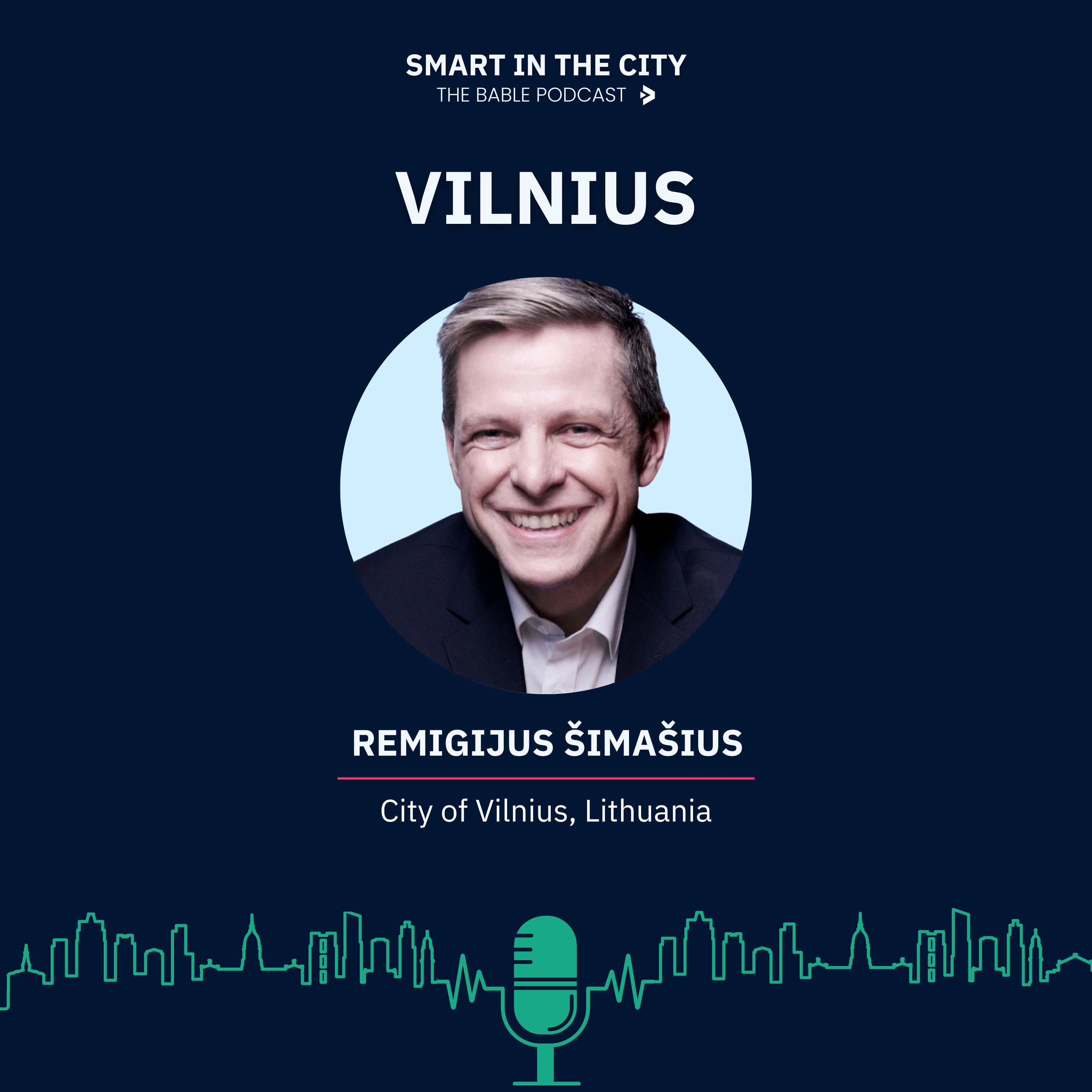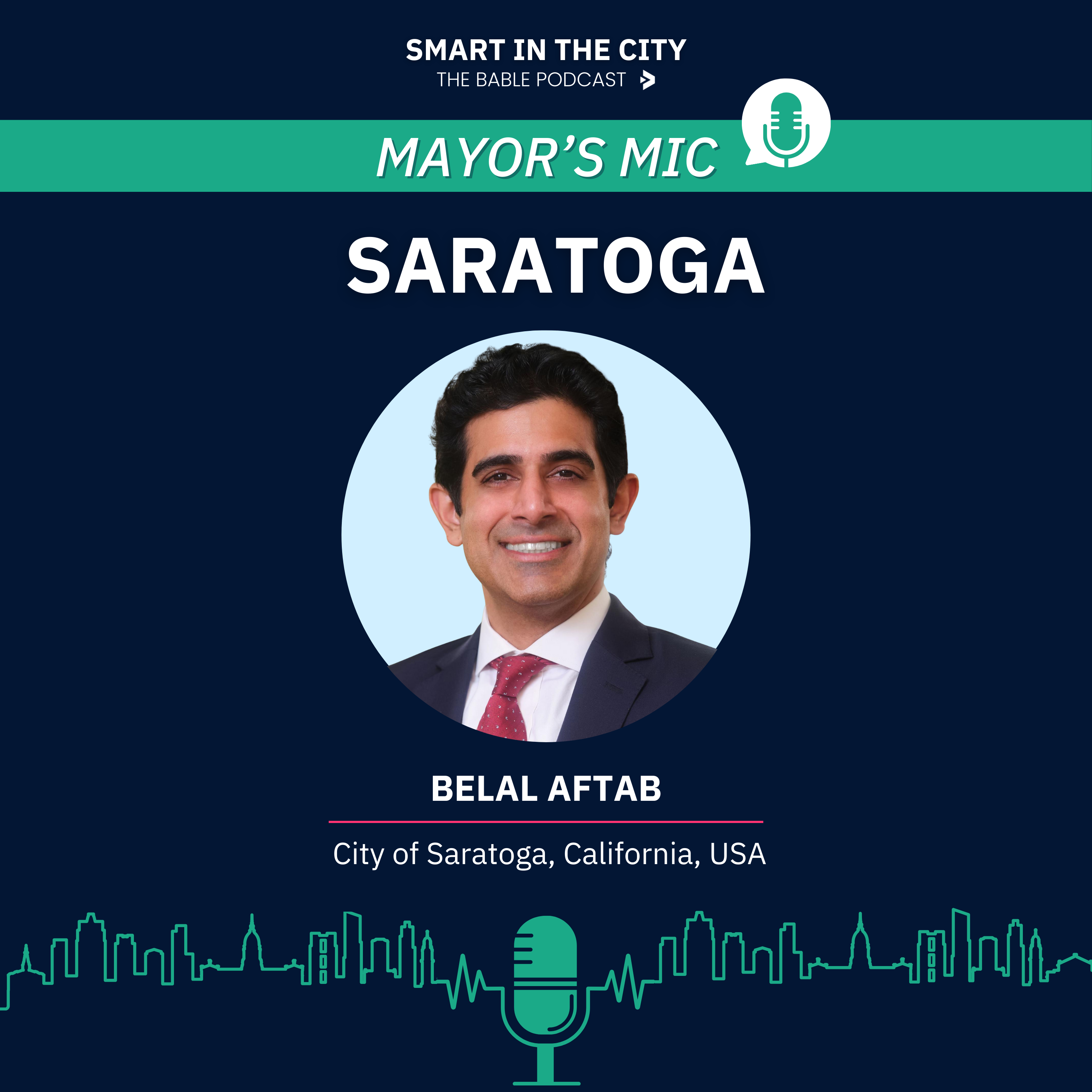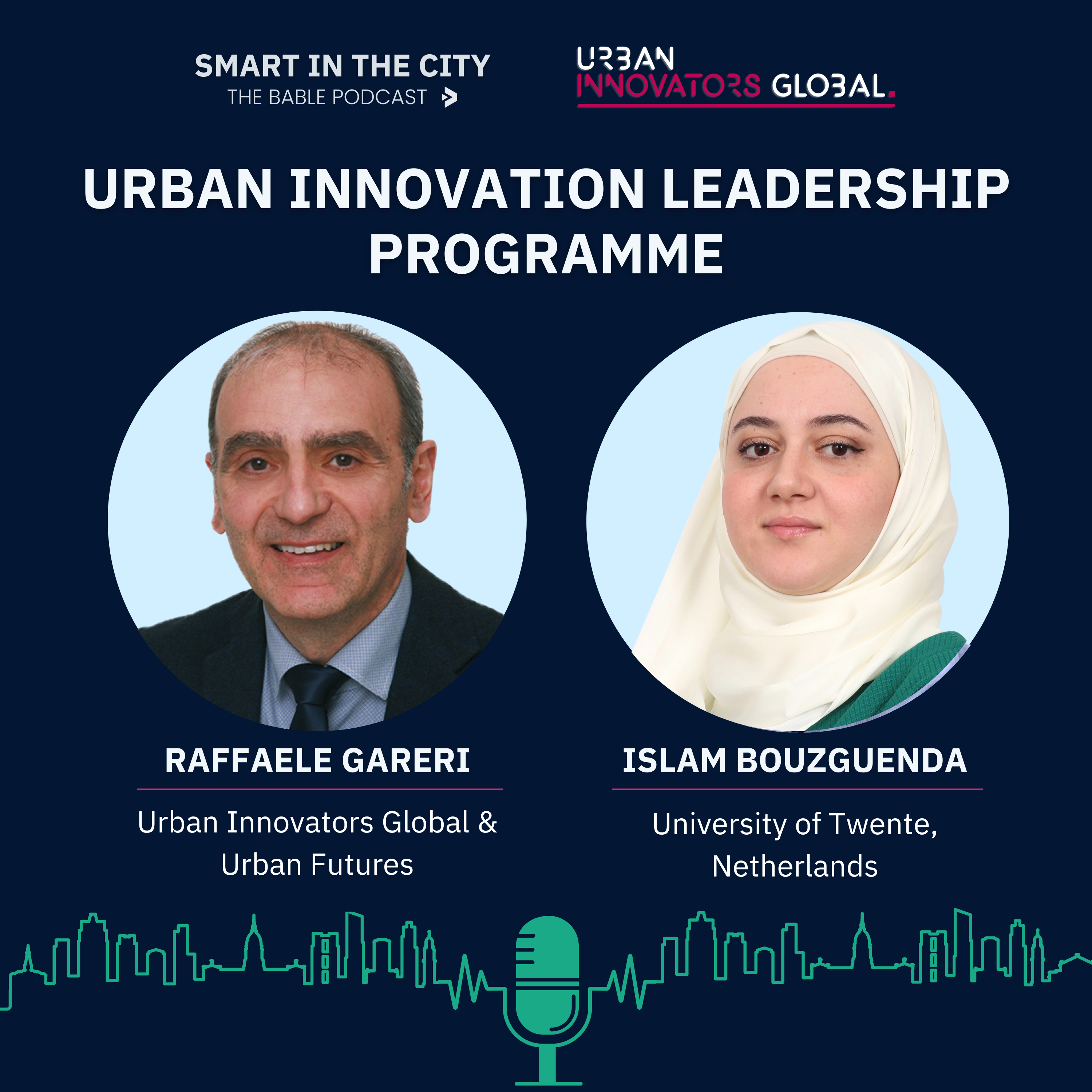Episode Transcript
[00:01:02] Gretel Schaj: Welcome to Smart in the City, the BABLE podcast. In this special episode, recorded live at the Change now summit in Paris, we're taking you on a journey to the French Alps, where the city of Chamonix is leading the way in tackling some of the biggest challenges facing mountain cities.
For that, it's a true honor to welcome Eric Fournier, mayor of Chamonix. Welcome to the podcast.
[00:01:25] Éric Fournier: Hello.
[00:01:27] Gretel Schaj: So we really like to start with a special question.
[00:01:30] Éric Fournier: Yes.
[00:01:32] Gretel Schaj: So if you had to describe Chamonix in only three words, what would they be? What would be these three words and why?
[00:01:41] Éric Fournier: First word, Mountaineering paradise. It's a very nice place for every mountaineering outdoor activity.
Second world, A place where you need to balance your choice. You have to do.
Because Chemonix is a very small city, only 9,000 inhabitants, but we can welcome 80 or 90,000 people in the very high season.
So it's very difficult to organize the balance between the social life of my inhabitants, the needs of all these touristic people, and of course the respect of the extraordinary landscape where we live. So it's the second world. And the third is perhaps freedom, because the mountains is still a place where freedom is possible and it's very rare in our society.
[00:03:11] Gretel Schaj: That's amazing. So freedom, balance and landscape and the mountainous landscape, I love that. I think I'm already sold out to go and visit.
So maybe also tell us, what is your background and what led you to your current role as mayor of the city?
[00:03:28] Éric Fournier: Well, when I was student I thought that I will be counselor in politic in public policies and not with an elected function. And the life drives me to this way.
I'm elected in Chamonix in charge of the municipality for 18 years. So it's a long term.
And also at the regional council for four terms.
These mandates are very complementary. It's very useful to be also in the regional council to deal with a larger scale on the same policies like transportation, environmental issues, waste or energy.
And it's a very rich experience for me. So I was at first more in council of these collectivities. And now my function is occupied at 120% by this mandate.
[00:05:09] Gretel Schaj: I can imagine, I can imagine that it takes most of your time.
Let me go back to this spontaneous landscape because tourism has long, for a long time been at the heart of Chamonix economy.
So how is the city rethinking tourism today to balance economic vitality with sustainability and the quality of life of its residents?
It's.
[00:05:37] Éric Fournier: It's the main subject we have to, to face.
We have to reinvent the tourism and tourism in an old place like Chamonix. Chamonix effectively is.
The history of tourism in Chamonix is old.
More than two centuries. More than two centuries. And the way to be a tourist is not the same.
And we have to organize a new tourism.
Considering the fact that we must reduce the environmental print of tourism on our city, on our own landscape. The main point of attention is the transportation, the weight of transportation when you are coming in a place, when you are tourist. 80% of your emission of gasified sale GES is due to transportation.
So we promote and we are investing on network of transportation.
A lot of a very important part of the local budget. It's the main part of capacity of investment, which is dedicated to this policy.
We also stopped since 15 years to promote the destination of Chamonix on long hold markets. Like long hauled countries, we prefer to organize the promotion on local, regional and European customers. Because they can arrive by train or by other means that airplanes, by example, you know that airplanes mean 1 tourists by airplanes means 10 tourists by railway by example. So we have to reorganize these things. And we have also to fix, not to fix, to put a limit of the growth of all the infrastructures and things we need for tourism. By example.
No more big hotel in Germany. It's not possible to build another big hotel in Germany.
We put a limit to the operations of renovation of this hotel.
40 rooms. And it's not possible if you are bigger. No more secondary house. I know it's not very popular, but I use a very new text of law in France called Loire le Mer, which exists till November 225, 2024 last year and which authorized the Mayo to put a limit of the growth of secondary oath. So all the lanes which would be built will be reserved for permanent inhabitants.
It's not very popular, but I think it's useful for the future of hautourism or landscape and our social tissue.
[00:09:57] Gretel Schaj: I think it's very interesting because these are very bold measures, hard to take decisions.
So how did you build the momentum and make sure that you could make those decisions and that people then will accept them and adapt to it. Because then at the end you're an elected position.
[00:10:19] Éric Fournier: And yes, yes, it's difficult.
You are never sure to be.
[00:10:36] Gretel Schaj: That.
[00:10:37] Éric Fournier: Your population will be with you. But the main reason why we took this measure is that we know that an important part of population could not stay in chamonix.
We have 70% of the using of the total of the housing of Chamonix which is now in a secondary house.
70%, only 30% is still for the permanent housing. So a lot of people, particularly the young people, young families cannot stay in overlay. And it's not possible to organize, to think, only to think that a city could live without its inhabitants. It's not possible.
We are not an attraction park. We are not only a place for leisure, we are a place where the inhabitants are part of the.
The city, part of the. Of the spirit of the city.
Okay, we have an extraordinary landscape, but landscape without the population is not enough.
[00:12:11] Gretel Schaj: Yeah, yeah. And then how did you like, what was your approach to maybe the hotel industry when you pass this regulation that certain building size could not be built anymore?
[00:12:24] Éric Fournier: It's not a low approach.
It's a way to consider the good balance.
We have nearly 80,000 beds which can be occupied by tourists in all of the valley. 80,000?
Do we need 90,000?
Do we need 100,000? No, 80,000 and not more. It's a lot of.
The economy is very strong. And I don't say that the economy is.
I'm not against the economy. The economy is very important for us to pay for social and environmental policies.
And I need economy, but I need good economy. And I want to do better, not more. It's the way we have to act.
[00:13:31] Gretel Schaj: I think it's a very good point on the better, no more. And I think you have also explored innovative ways to look at problems that are there and trying to find a solution. And I really like this idea of this creation of a scientific advisory board that you have, the municipality. So could you tell us more about why you set it up and how science now informs your city's decision making?
[00:13:59] Éric Fournier: Yes, we organize a scientific council with the local political authorities.
The objective of this scientific council are to provide expert advice and recommendation when we have to choose and to spoke about policies like energy or biodiversity, by example.
It's also to support forward looking discussions and strategic planning for the VALE long term adaptation to give us some ideas and new ideas for the scientific tourism strategy. I said that we said stop. We don't need more development.
But by example, is it useful to choose to stop long hold markets?
Because you can have a reaction if you consider the air quality. By example. The air quality is better if people don't come with cars, but if they came with planes at 100 km in Geneva, by example.
Okay, the air quality locally is very good. But is the global balance is good? I don't think so. We have to organize the debate with experts and scientists.
To share decision with the population.
It's very important to reduce the.
The place between experts, scientists and political decisions. So it's a sense of this Scientific Council, which can also take decision and take a subject by itself.
[00:16:35] Gretel Schaj: Right. So it's a very interesting setup that you have there with the council and this Scientific Commission.
And sometimes scientists are criticized to be too technical and too far away, maybe from politics or from the daily lives of people. So how is that connection or that communication happening? How do you make it like the scientific part, digestible for the people who need to use it for making decisions and also maybe for the citizens?
[00:17:08] Éric Fournier: Our job is to organize the communication. We have to understand and to transform the advice we have from the Scientific Council in a good communication and to organize also the balance and the impact to explain the impacts of this choice. So it's not a problem if in the first time it's a little bit technical.
It's our job after to deal with this and to share with our population. I think it's very important.
And we are also in this Scientific council, social members of issue of social disciplines.
And so they can help us to organize and to decline the communication.
[00:18:13] Gretel Schaj: Thank you for that. And maybe now, looking into the future, what is one main challenge that you will be working on for the coming years for make Chamonix better, better place?
[00:18:27] Éric Fournier: I think in a world it's the ability, the habitability capacity of the mountaineering areas.
Climate change have such important effects on all territories. But I think we have to understand that in one or two decades the problem is to organize the habitability of all territories.
It's not very easy to think about it, but it's very important.
So we can decline after in local policies, economics, transportation.
But natural risk also because we change in terms of natural risk with climate change are very important.
Flooding risk by example, glacier are very.
Are less important than in terms of areas.
And so we have to organize and to have a look on this subject.
[00:19:52] Gretel Schaj: Yeah. So it's addressing. Addressing the challenges, but then also adapting to the things that we cannot change.
There is one part of the podcast that it's a segment special shout out.
So could you name maybe a person, an organization, a city or a town that you think it deserves more recognition on what they do in the field?
[00:20:17] Éric Fournier: I think that the environmental association needs to be more.
Need a better.
[00:20:29] Gretel Schaj: Recognition.
[00:20:30] Éric Fournier: Yes, recognition. Yes. Because when we can make a common culture with them, it's very important to create the condition of sharing public policies. And they are very important.
[00:20:53] Gretel Schaj: Yeah, thank you very much. I think that's.
It's very interesting also, like all these elements that combine. And I would like you the last question, which is a question that we ask every guest. So to you, what is a smart city?
[00:21:09] Éric Fournier: I think. I don't know if it's very original, but I think a smart city is a city when you can balance social, environmental and economic issues.
It's very important to keep the three parts together because you need the economy to pay to others and you need to keep a social environment very strong because the human and the environmental issue could not be separate.
[00:21:51] Gretel Schaj: And I think that's a very also reflection of Chamonix and the policies that you are trying to implement. So thank you. Thank you very much for your time today.
[00:21:59] Éric Fournier: Thank you very much. And I apologize for my English.
[00:22:03] Gretel Schaj: That was perfect. And I really enjoy hearing more about Chamonix and the work you're doing. Thanks also to Change now for making this episode possible and allowing us to record here in the heart of Paris.
And to all our listeners, don't forget, you can always create a free account On BABLE Dash, SmartCities EU to find out more about Smart city projects, solutions and implementations. Thank you very much.
[00:22:25] Éric Fournier: Thank you.
[00:22:27] Gretel Schaj: That was great.
[00:22:28] Éric Fournier: Thank you.
[00:22:29] Gretel Schaj: And your English was really good.
I wish my French was like that.
[00:22:36] Éric Fournier: Thank you very much. It was not easy for me, but.
[00:22:39] Gretel Schaj: Thank you very much.
Fabulous. Very. It.


